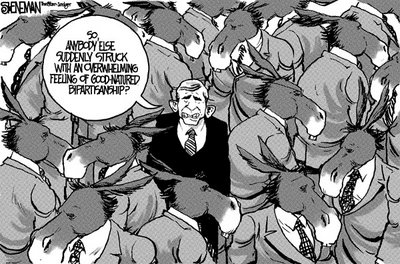
The lame-duck Congress has convened for the post-election session, where it will try to get some business done before the Democrats take over the new Congress in January. But the more interesting action turns on who will lead both parties in the new Congress.
The lame-duck President, meanwhile, has sent that Congress a wish list that would seem to contradict his calls for bipartisan consensus, inasmuch as they represent an effort to force through controversial measures before the Democrats take over.
The president's top priorities are a measure to legalize his once-secret warrantless eavesdropping program, the extension of his tax cuts and Senate confirmation of John Bolton to be United Nations ambassador and, the least controversial item, Senate backing of Robert Gates to succeed embattled Defense Secretary Donald Rumsfeld.
His chances of success are slim to none, unless outgoing Senate Majority Leader Bill Frist changes some ground rules to allow simple majority votes in situations that currently require more than that. Even that would be chancy, and it would probably be foolish for Republicans to try it in the face of voter anger. Whether you think Democrats earned a mandate or not on Nov. 7, trying to push something through now because you don't think it would pass in the newly elected Congress would go very badly for the GOP if they have misread the public mood.
But it's rather telling that Bush says one thing when he's vulnerable, and another when he holds the power. One would have thought that Bush would have refrained from the attempt simply to avoid poisoning relations with the Congress he'll have to deal with for the last two years of his term. Apparently not.
Perhaps we shouldn't be surprised. As outgoing GOP Senator Lincoln Chafee recounts, the last time the electorate was closely divided, the Bush administration didn't exactly reach across the divide.
Back in December 2000, after one of the closest elections in our nation’s history, Vice President-elect Dick Cheney was the guest at a weekly lunch meeting of a small group of centrist Republicans. Senators Susan Collins and Olympia Snowe of Maine, Senator Jim Jeffords of Vermont, Senator Arlen Specter of Pennsylvania and I were honored to have the opportunity to visit with him on the eve of a session of Congress in which, because of Republican defeats, the Senate would be evenly divided at 50-50.
As we sat in Senator Specter’s cozy hideaway office and discussed the coming session, I was startled to hear the vice president dismiss suggestions of compromise and instead emphasize an aggressively partisan agenda that included significant tax cuts, the abandonment of international agreements and a muscular, unilateral foreign policy.
I was incredulous. Instead of a new atmosphere of cooperation and civility which, after all, had been the promise of the Bush-Cheney campaign, we seemed ready to return to the poisonous partisanship that marked the Republican-Congress — Clinton White House years.
Of course, bipartisanship is a two-way street, and it remains to be seen how Democrats will handle their end of the bargain. For now, they're saying all the right things. And other prominent Democrats, like Leon Panetta, are going beyond pleasantries.
The legislative work can begin on areas where there is likely consensus: immigration reform, lobbying and ethics reform, and education with the reauthorization of No Child Left Behind.
If that works, Congress and the administration can move on to negotiate tougher issues like establishing long-term budget discipline, expanding energy alternatives, fixing the prescription drug benefit and increasing the minimum wage.
And, finally, on the war in Iraq, despite the bitter differences, both the Democrats and the president face the same brutal reality. We need a new strategy to stabilize Iraq so that our troops can begin to come home without leaving a disaster behind. The president took an important step by replacing Secretary of Defense Donald Rumsfeld with Robert Gates. The Iraq Study Group led by James Baker and Lee Hamilton, of which I am a member, will soon make its recommendations, which we hope will provide the beginning of a unified strategy.
Panetta makes an important argument: that the Baker Report will be a starting point, not an ending point. And it remains to be seen whether Bush can participate constructively in the winding down of his Iraq adventure, and whether Democrats can rein in their more leftist members to arrive at a resolution that addresses U.S. national interests. That means getting out of Iraq sooner rather than later so we can refocus attention on actual terrorists -- but not so fast that we jeopardize our interests, or fail to fulfill our ethical obligation to the Iraqi people.
The fate of both parties in 2008 rest on how they rise to this challenge.
politics, midtopia

No comments:
Post a Comment